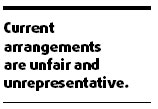Opening the rich countries' club to others
As the financial meltdown continues, the good news has been US President Georege W. Bush's call for a G20 Leaders' meeting tomorrow in Washington.
Don't we have enough such meetings already? Yes, but not necessarily of the right kind. "Black September" underscored that we live in a globalized economy.
The subprime crisis that started in Wall Street spread like wildfire to the rest of the world, and the glee and Schadenfreude with which it was first received by many abroad was quickly dispelled as stock markets and currencies crumbled. Tens of trillions of dollars have been lost. Solutions are nowhere in sight.
The financial sector is about five times the size of the real economy, yet, the enormous financial imbalances that exist in today's world are unregulated and at least one source of the financial havoc we are witnessing.
Some have proposed the creation of a global financial regulator, which, necessary though it may be, is unlikely to be effected in the near future. More broadly, this reveals the deficits in global governance, of which the exclusion of China and India is a prime example.
With $1.9 trillion, China has a quarter of the world's hard currency reserves (up from 5 percent in 1990). Yet, it does not have a place at the table of the G7 Finance Committee (nor at the G8, for that matter), where issues of financial coordination among the world's most industrialized nations are discussed.
Everybody says China is part of the solution; yet, how should that happen if it isn't even a member of the club that decides such matters? Should it just send a check in the mail?
Yet, China at least is a member of P5 - the five permanent members of the United Security Council, thus having a voice on key international security matters in their premier forum.
India, another Asian giant, is neither in the G8 nor the P5, thus feeling particularly disenfranchised.
The G7 was established in the late 1970s to search for a measure of macro-economic coordination among the world's leading economies.
Formed by the United States, Germany, Japan, France, the United Kingdom, Canada and Italy, its yearly summer meetings became one of the key exercises in summitry. Its selectivity made it effective, as leaders from the rich countries exchanged views in an informal setting which eschewed formal speeches for more productive give-and-take. In the 1990s, in the one gesture made by the West to post-Soviet Russia, the latter was invited to join, thus becoming the G8.
Yet, twenty years after its initial founding, it became apparent that these countries represented a shrinking share of the world's product, and, with the "Asian crisis" of 1997-1998, an expanded version of the G7 Finance Committee was launched, a -20, which added many key nations from the developing world, whose Finance Ministers thus joined these deliberations.
In the end, though, certain decisions can only be made at the highest levels. The notion that it was the G8 itself that needed to expand spread.

Emerging powers like China and India, but also countries like Brazil, Mexico and South Africa, richly endowed in population, territory and natural resources, became candidates to join. Inviting their leaders for only part of the G8 sessions was the initial response, but eventually became untenable.
In the 2007 G8 Summit in Heiligendamm, Germany, the communiqu was issued before the Outreach Five (Brazil, China, India, Mexico and South Africa) met with the G8, adding a measure of farce to what was seen by many as mere window-dressing.
It is time to get serious. For several years two Canadian think tanks, CIGI and the Center for Global Studies, have pushed for a Leaders' G20 meeting as a way of breaking global deadlocks and making progress not just on international financial regulation, but also on issues as varied as climate change, international migration and agricultural subsidies.
Many simulations and "shadow meetings" around the world of this "Breaking Global Deadlocks" project have shown the fruitfulness of it. Extant tools to cope with such issues are either obsolete or not working.
As US Treasury Secretary Henry Paulson has said himself, "If you look at the global financial architecture, I don't think it reflects the global economy."
Current arrangements are unfair and unrepresentative. Unfair because they are based on a set of rules based on Northern preferences and convenience - not just on the composition of the G8.
The cozy arrangement whereby the two leading international financial institutions (IFIs), that is, the IMF and the World Bank are always led by a Western European and an American, respectively, although they deal largely with the developing world, has become unacceptable.
Moreover, the unwillingness of the IFIs to actually hold Northern countries accountable for the same financial mismanagement they relish in accusing developing countries of has deprived them of much credibility. What has the IMF to say about the ballooning, $500 billion fiscal deficit, $10 trillion dollar public debt and current account imbalances of the United States?
One can always argue about who else should be on groups such as these. But the G20 is an informal body that already exists, making it easy to build on it.
Capitalism may not be in its last throes, but the Northern hubris according to which the answers were to be found in Washington, London or Paris and all the rest of the world needed to do was to follow instructions emanating from these capitals certainly is.
The rich countries' club has opened its doors, realizing that we are all in this together. President Bush's calling of the G20 Leaders' meeting may be the single most forward-looking initiative of his eight-years in office.
The author holds the Chair in Global Governance at the Balsillie School of International Affairs and is a distinguished fellow at the Center for International Governance Innovation in Waterloo, Ontario
(China Daily 11/14/2008 page9)














